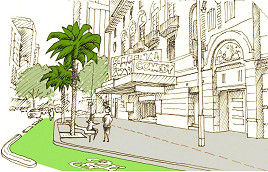People’s panel torpedoes civic space
By Shane Scanlan
The “people” have torpedoed the City of Melbourne’s five-year ambition to relocate parking and trader amenities under Queen Victoria Market's (QVM) heritage-listed sheds in order to build a new civic space.
A council-initiated, 40-person “people’s panel” released 14 recommendations on November 23, effectively killing the development and also casting doubt on Lord Mayor Sally Capp’s leadership.
The relocated facilities were central to a “land swap” which would have seen the current 1.5ha market car park re-purposed as civic space for the burgeoning City North population. Without this central aspect, only market upgrades, repairs and maintenance remain.
Under the “people’s panel” recommendations, the car park stays where it is. But a 14-person minority report preferred public open space for this area and recommended looking at relocating parking and trader facilities under Queen St. It is unclear whether this is practical and it is also unclear whether the council would pursue this.
Councillors could still technically reject the “people’s panel” recommendations and press ahead with their original direction or a Queen St option. But it is clear they will not take on or resubmit to Heritage Victoria (HV), which in March refused to issue a heritage permit for the under-shed works.
The “people’s panel” was Cr Capp’s idea in response to a pre-election promise to consult. Discrediting its recommendations would be a political risk.
Queen St might turn out to be practical, but you would imagine it would have already been already considered.
What’s more likely is that councillors will put the $54.39 million it has so far saved and allocated for QVM into other projects. And it need not worry about raising a further $200 million. By September, it had spent $18.5 million on the market. And that’s not taking into account $129.3 million to purchase and redevelop the adjacent Munro site for community facilities – a move it justified in 2014 as central for a successful market redevelopment.
Abandoning the substance of the project will also mean headaches for the council because of a contract it has with the state government. Under this deal, the council was to be granted Crown land to the south of the market, which it intended to develop commercially to defray some of its costs. In exchange, it was to re-route Franklin St through the car park.
Should critics choose to do so, they could lay blame for the project’s demise at the feet of Lord Mayor Sally Capp. Voting on August 7 against the idea of vesting authority in a “people’s panel” were councillors Wood, Louey, Pinder and Riley.
At the time, Cr Arron Wood said: “If we’re going back to a first principles approach, what if the people’s panel says ‘let’s not renew the market’? and ‘let’s leave it as it is’. Well we should accept that decision because that’s the people’s umpire that we’re subscribing to.”
Immediately before Cr Capp joined the council in May, councillors had voted to resubmit to HV its plans for a three-level basement under the western end of sheds A, B, C and D. The only dissent to this came from councillors wanting a legal appeal against HV.
Cr Capp would counter that, given that Heritage Victoria had previously rejected the underground basement, there was no choice other than change direction.
Doubt will also be cast over the role of the panel’s facilitators who, when faced with a threat of significant “walk outs” after the third of four sessions, relaxed the rules of engagement.
Six sessions were held and many of recommendations returned were clearly outside of the original terms of reference, which limited the focus to facilities only. The panel ended up recommending on how the market should be run, including granting generous lease terms for traders.
According to sources, the turning point in the direction of the “people’s panel” was the recent public release of HV’s decision to reject the basement proposal.
Heritage Victoria executive director Steven Avery subsequently personally explained to the panel the reasons for the rejection – a privilege not afforded to the City of Melbourne.
From that moment onwards, it was assumed there was no longer any point leaving the council’s preferred option in the mix.
With the market project in tatters within a year of the demise of former lord mayor Robert Doyle, it is tempting to reflect on how things might have been if he was still in the big chair at the front of the chamber.
Primarily because of Mr Doyle's relationship with the Premier, I believe it would have been full-steam ahead.

Council endorses office tower at Flinders Lane despite querying car park demolition






 Download the Latest Edition
Download the Latest Edition